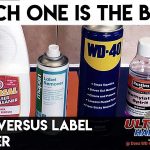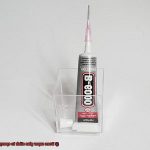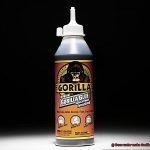Are you a DIY enthusiast or a professional who has ever wondered whether super glue can withstand exposure to gasoline? If so, you’re in the right place. Super glue, also known as cyanoacrylate adhesive, is a game-changing adhesive that can bond almost anything in seconds. But when it comes to gasoline, things get complicated.
Gasoline is a highly volatile substance that can corrode and dissolve most adhesives, leading to weakened bonds or complete bond failure. This is particularly concerning for automotive applications where gasoline is a common fuel. So, the question remains – does super glue hold up to gasoline?
In this post, we’ll explore the science behind super glue and gasoline and how they react when they come into contact. We’ll also examine the strength of the bond created by super glue under exposure to gasoline and compare it with alternative adhesives that are better suited for gasoline-resistant applications.
If you’re curious about the limitations of super glue or want to learn more about gasoline-resistant adhesives, keep reading. By the end of this post, you’ll have all the information you need to make informed decisions about which adhesive is best for your project.
What is Gasoline and Its Effects?
Contents
- 1 What is Gasoline and Its Effects?
- 2 Does Super Glue Hold Up to Gasoline?
- 3 The Chemical Composition of Gasoline
- 4 How Hydrocarbons Affect Super Glue
- 5 Reasons Why Super Glue May Not Be Suitable for Use with Gasoline
- 6 Alternatives to Using Super Glue with Gasoline
- 7 Tips for Working with Petroleum-Based Products
- 8 Conclusion
Gasoline is a versatile liquid that has become an essential component of our daily lives. It powers our cars, boats, and other machinery, and is also used as a solvent in various industrial applications. However, with its usefulness comes the potential for harmful effects on both humans and the environment.
Gasoline is a mixture of hydrocarbons – organic compounds made up of carbon and hydrogen atoms. These hydrocarbons release pollutants into the air when burned in an engine, contributing to smog, acid rain, and other forms of air pollution. Breathing in gasoline vapors can also pose health risks, such as dizziness, headaches, and nausea. Long-term exposure to gasoline can cause serious health problems like liver and kidney damage.
Moreover, gasoline has a significant impact on the environment. The release of pollutants into the air contributes to global warming and climate change. Gasoline spills can also contaminate soil and water sources, affecting wildlife and ecosystems.
When using super glue around gasoline, it’s crucial to be cautious. Super glue is not resistant to gasoline, and its chemical composition interferes with the bonding process of the adhesive. Gasoline contains hydrocarbons that dissolve the adhesive properties of super glue, resulting in a weakened bond or complete breakdown.
To ensure safe and effective bonding around gasoline or other petroleum-based products, specialized adhesives designed to work with these materials should be used. These adhesives provide a strong and long-lasting bond without compromising safety.
Does Super Glue Hold Up to Gasoline?
The answer is not straightforward, as it depends on the type of super glue you choose. Let’s dive into the details.
Firstly, gasoline is a potent liquid that contains chemicals that can break down some types of adhesives. Cyanoacrylate-based super glues, the most commonly used, can lose their adhesive properties when exposed to gasoline. Moreover, prolonged exposure to gasoline can make them brittle and prone to cracking, which makes them unsuitable for use in high-stress environments.
However, fear not. There are heavy-duty or industrial super glues available that can withstand gasoline exposure. These super glues contain special additives that make them resistant to chemicals and extreme temperatures. They’re the true heroes of bonding.
If you’re planning on using super glue with gasoline, make sure to select a heavy-duty super glue specifically designed for this purpose. To ensure a strong bond, follow the manufacturer’s instructions carefully and ensure that the surfaces you’re bonding are clean and dry before applying the glue.
The Chemical Composition of Gasoline
Ah, gasoline. That magical elixir that powers our cars and keeps us moving forward. But what is it exactly that makes gasoline so special? Well, it turns out that gasoline is a complex mixture of hydrocarbons – compounds made up of hydrogen and carbon atoms. These molecules can have anywhere from 8 to 12 carbon atoms per molecule, which gives gasoline its unique chemical makeup.
But that’s not all – gasoline also contains a variety of additives that help improve its performance. Detergents are added to clean fuel injectors, anti-corrosion agents protect the engine, and oxygenates increase fuel efficiency. All of these components work together to create a powerful fuel that keeps our cars running smoothly.
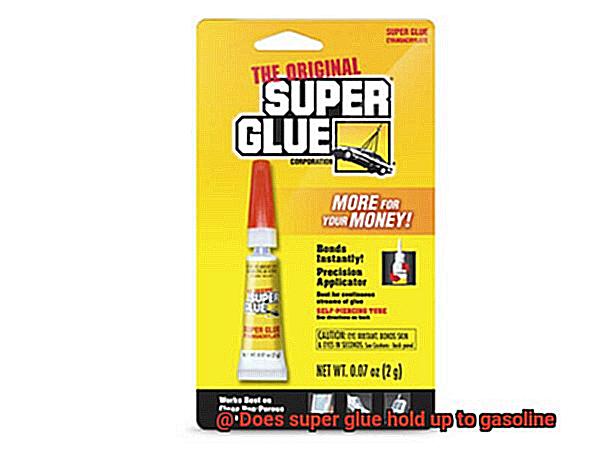
However, one thing to keep in mind is that gasoline is highly flammable. This is because the hydrocarbons in gasoline are easily vaporized and can form an explosive mixture with air. As a result, it’s crucial to handle gasoline with care and never use it near an open flame or other ignition source.
Now let’s talk about super glue. This fast-drying adhesive forms a strong bond between surfaces by reacting with moisture in the air to create long chains of molecules. However, when exposed to gasoline, the bond can weaken or dissolve due to the chemical properties of the hydrocarbons in gasoline. This is especially true if the bond experiences heat or pressure.
While super glue may be useful for many applications, including bonding plastic and metal, it may not be the best choice for use in environments where it will be exposed to gasoline or other harsh chemicals. If you need a strong bond in these types of situations, you’ll want to look for heavy-duty industrial super glues with special additives that can withstand gasoline’s chemical assault and extreme temperatures.
How Hydrocarbons Affect Super Glue
Hydrocarbons are organic compounds composed of hydrogen and carbon atoms. Gasoline, a common hydrocarbon, is derived from crude oil and contains a mixture of these compounds. Super glue, on the other hand, is designed to bond materials quickly and effectively.
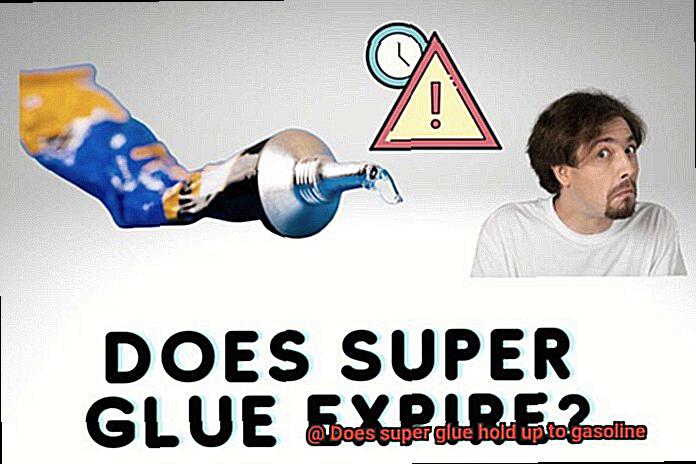
When gasoline comes into contact with super glue, it can cause difficulties for the adhesive. Hydrocarbons can soften and weaken many adhesives, including super glue. This means that gasoline can weaken the bond between the glue and the surface it is applied to over time. Additionally, hydrocarbons can break down the chemical structure of super glue itself. Specifically, the cyanoacrylate molecules in super glue are particularly vulnerable to attack by hydrocarbons, which can break down and form new compounds that ultimately weaken the adhesive’s holding power.
It’s worth noting that the extent to which gasoline affects super glue depends on several factors. These include the type of super glue used, the surface it is applied to, and how long it is exposed to gasoline.
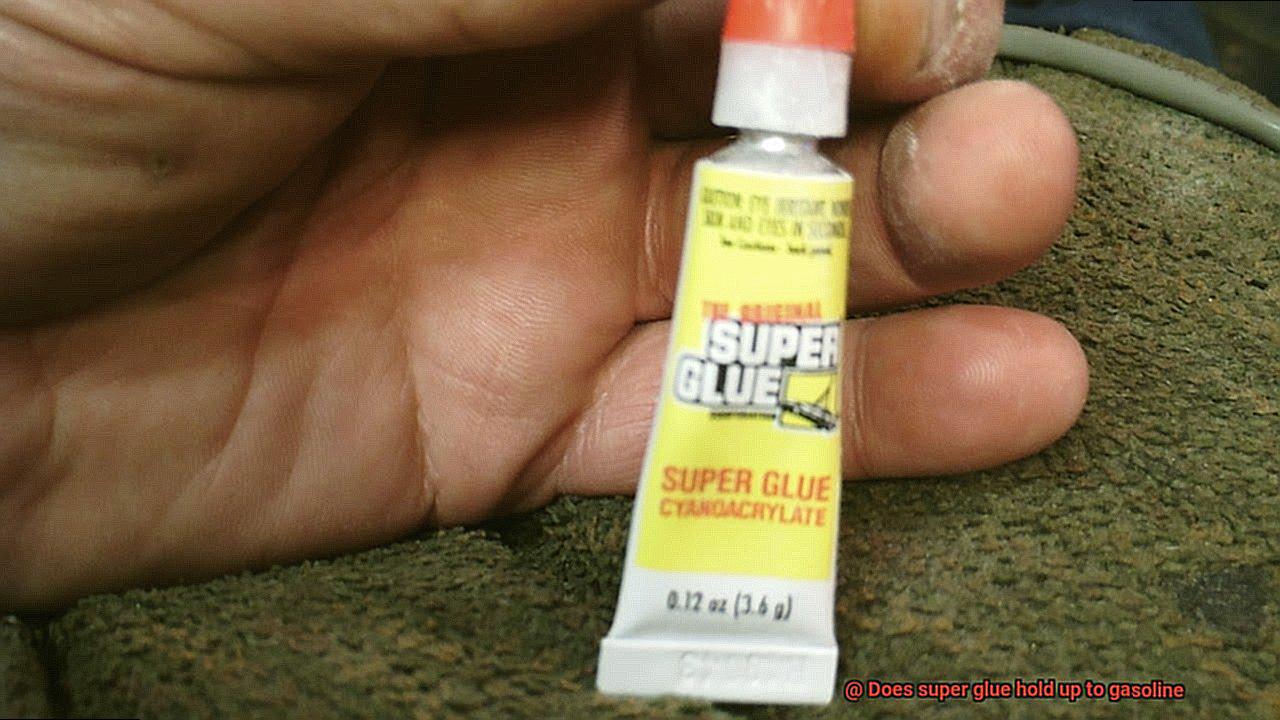
So, what does this mean for you? If you need to bond materials that will come into contact with gasoline or other harsh chemicals, it’s best to use an adhesive that is specifically designed for this purpose. While super glue may work in some cases, it’s not always reliable when exposed to hydrocarbons.
Reasons Why Super Glue May Not Be Suitable for Use with Gasoline
If you have ever needed a quick fix, super glue may have seemed like the ideal solution. However, it is important to understand why it may not be suitable for use with gasoline. Here are five reasons why:
Chemical Composition
Gasoline is made up of various chemicals, including hydrocarbons, which can break down the bonds created by super glue. This means that the bond created by super glue weakens and eventually breaks down when it comes into contact with gasoline. The chemical composition of gasoline can weaken the adhesive bond and cause it to fail.
Temperature
Gasoline is highly flammable and can get extremely hot when exposed to heat or friction. This high temperature can cause the super glue to break down and lose its adhesive properties. If you are using super glue on materials that will come into contact with gasoline, such as fuel tanks or hoses, you run the risk of the bond breaking down due to high temperatures.
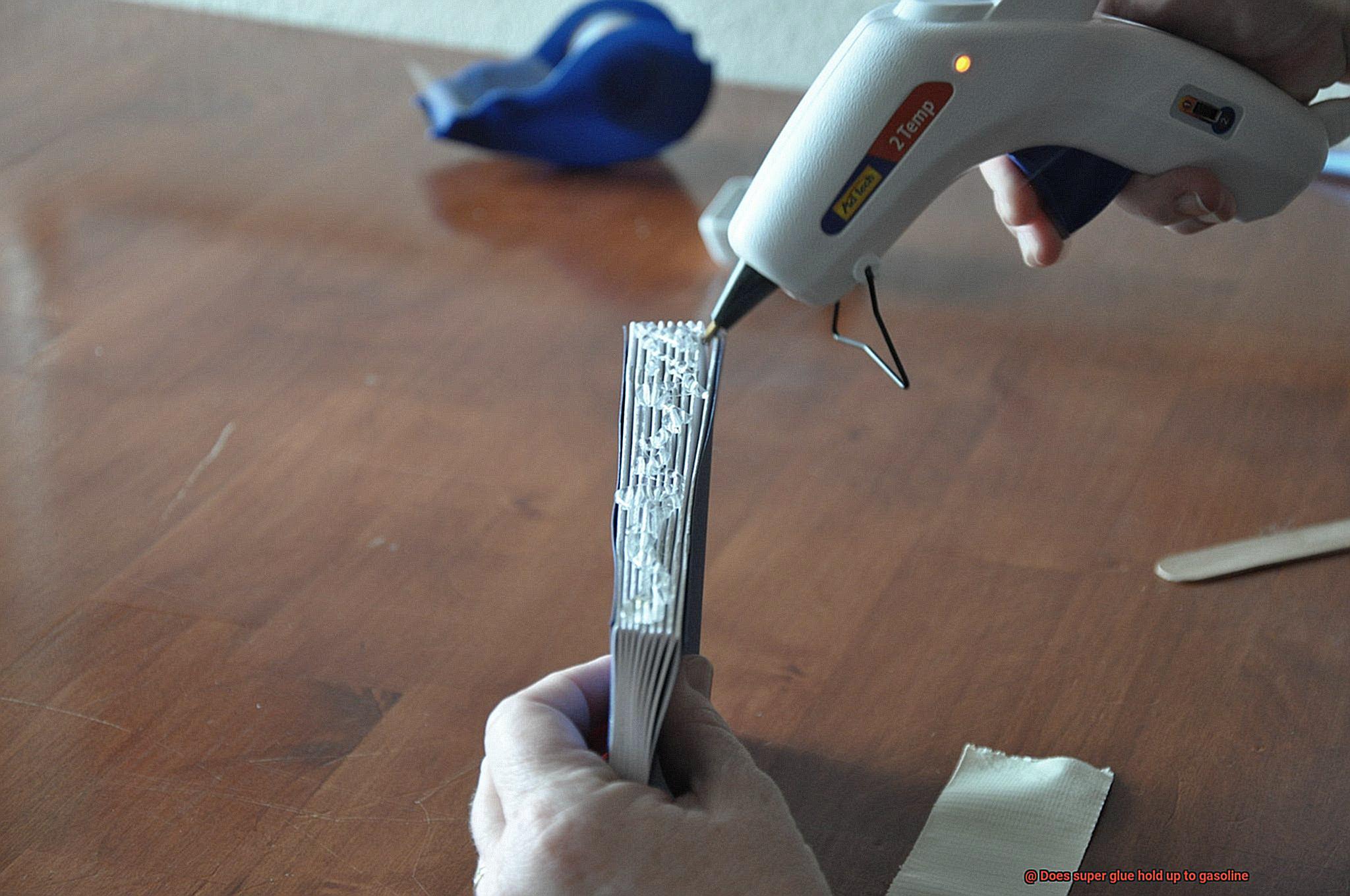
Vibration
Vehicles and machinery that run on gasoline often experience vibration and movement, which can cause the bond created by super glue to weaken and eventually fail. Super glue is not designed to withstand exposure to constant vibration and movement. Therefore, if you are using super glue on materials that will be subject to constant movement, such as fuel lines or pumps, it may not provide a reliable or long-lasting bond.
Solubility
Gasoline is a solvent and can dissolve certain types of adhesives, including super glue. This solubility can cause the bond to deteriorate over time, making it less effective. Therefore, if you are using super glue on materials that will be exposed to gasoline, it may not provide a reliable or long-lasting bond. When exposed to gasoline, the solubility of super glue can cause the bond to weaken and eventually break apart.
Flammability
Finally, gasoline is highly flammable, and so is super glue. Using super glue with gasoline can create a dangerous situation, as it increases the risk of ignition. If the bond fails and gasoline is spilled, the likelihood of a fire or explosion increases.
Alternatives to Using Super Glue with Gasoline
There are better alternatives out there that can offer more durable and reliable results.
First on the list is epoxy, a two-part adhesive that creates a strong chemical bond when mixed together. Perfect for automotive repairs or other applications where gasoline may be present, it can withstand exposure to gasoline and other chemicals, ensuring a long-lasting bond that won’t falter.
If you’re after a thicker consistency than traditional super glue, cyanoacrylate glue or “super glue gel” is also a good option. Its thicker formula makes it more effective at bonding with certain materials, but just like regular super glue, it may not hold up well over time when exposed to gasoline.
For those who need a flexible and waterproof seal, silicone adhesive is the way to go. It can withstand high temperatures and exposure to harsh chemicals like gasoline, making it ideal for sealing fuel tanks or other automotive parts. It’s the perfect solution for those seeking a durable bond that can last through any challenge.
Tips for Working with Petroleum-Based Products
Petroleum-based products are commonly used in various industries, including construction, automotive, and manufacturing. However, these products can pose serious safety risks if not handled correctly. Here are five sub-sections explaining the importance of taking safety precautions when working with petroleum-based products.
Proper Adhesive Selection
Choosing the right adhesive is crucial when working with petroleum-based products. Not all adhesives have the same properties, and some may not be compatible with these types of materials. Using the wrong adhesive can weaken or dissolve the bond, leading to potential safety hazards. It is essential to select an adhesive that is specifically designed to work with petroleum-based products to ensure a strong and lasting bond.
Clean and Dry Surfaces
Before applying any adhesive, it is important to make sure that both surfaces are clean and dry. Petroleum-based products can leave behind residue or oils that can interfere with the bonding process. Failure to clean the surfaces properly can result in a weak bond or even complete failure.
Adhesive Application
When working with petroleum-based products, it is best to apply the adhesive sparingly to avoid weakening or dissolving the bond. A thin layer of adhesive is often sufficient for achieving a strong bond. Applying too much adhesive can lead to excess residue that can interfere with the curing process.
Ventilation and Protective Gear
Petroleum-based products can release fumes that are harmful if inhaled. Always work in a well-ventilated area to prevent inhalation of fumes and reduce the risk of fire or explosion. Wear protective gear such as gloves, goggles, and a respirator when handling these products to protect your skin, eyes, and lungs from exposure.
Proper Storage and Disposal
Petroleum-based products should be stored in a cool, dry place away from heat sources and open flames. They should also be kept out of reach of children and pets. In case of spills or drips, clean up immediately using absorbent materials like kitty litter or sand. Dispose of these materials properly in accordance with local regulations.
dA7gQpHv9vs” >
Conclusion
In conclusion, it’s important to remember that not all adhesives are created equal when it comes to gasoline. While super glue is a quick and easy solution for most bonding needs, it’s not suitable for use with gasoline due to its highly volatile nature. Gasoline can corrode and dissolve most adhesives, leading to weakened bonds or complete bond failure.
However, fear not. There are specialized heavy-duty or industrial super glues available that can withstand gasoline exposure. These specialized adhesives contain special additives that make them resistant to chemicals and extreme temperatures, providing a strong and long-lasting bond without compromising safety.
But if you want to avoid the risk altogether, there are other alternatives such as epoxy, cyanoacrylate glue (super glue gel), and silicone adhesive that offer more durable and reliable results when working with petroleum-based products.
When working with gasoline or other petroleum-based products, safety should always be your top priority. Proper adhesive selection, clean and dry surfaces, ventilation and protective gear, and proper storage and disposal are all crucial steps in ensuring safe and effective bonding.



